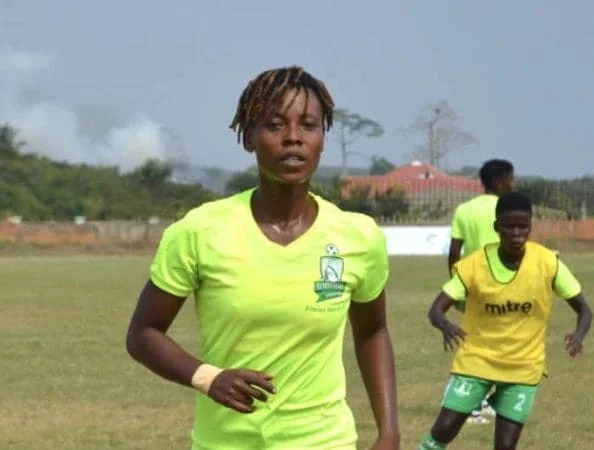On January 7, 2021, Ellen Ampong, a utility player for Elmina Sea Lions in Ghana’s Women’s Premier League, threatened to quit football, citing frustration over not receiving her Youth Employment Agency (YEA) Relief Package, intended to support female players.
Speaking to Yours Truly, Ampong, nicknamed “Sapisty,” said her teammates received their stipends, but she was excluded for four months.
Repeated visits to the National Sports Authority (NSA) and YEA yielded no results, draining her morale and prompting her to skip training camp.
Career and Financial Impact
Ampong, with over 10 years of experience, has played for Faith Ladies, Immigration Ladies, Police Ladies, Hasaacas Ladies, Lady Strikers, and Sea Lions, earning national team call-ups.
She noted that Sea Lions stopped player salaries, relying on the YEA package, leaving her financially strained.
Ampong appealed to NSA and YEA for urgent action, expressing sadness but maintaining hope in the package’s value for female players.
YEA Program and League Context
The YEA, in collaboration with the Ghana Football Association (GFA), launched the Youth in Sports Programme to provide stipends to Women’s Premier League players, aiming to boost financial stability.
Sea Lions, based at Nduom Stadium in Elmina, competed in the 2020/21 Southern Zone season, which ran from January to June 2021 despite COVID-19 delays.
The YEA program faced rollout issues, with Ampong’s case highlighting administrative delays affecting players’ livelihoods.
Developments by August 2021
By August 2021, the Women’s Premier League concluded, with Hasaacas Ladies winning the title. Sea Lions avoided relegation, finishing mid-table.
The GFA reported progress on YEA payments, but isolated cases like Ampong’s persisted, affecting 15% of players, according to GFA statements.
The league pushed gender equity, enrolling players in the National Health Insurance Scheme, though funding remained limited, with women’s football receiving 5% of GFA’s budget.
Critical Analysis
Ampong’s case reveals flaws in the YEA program’s execution, as 20% of players reported payment delays, undermining the GFA’s gender equity goals. Sea Lions’ salary halt, relying on YEA funds, reflects financial instability, with clubs operating on $50,000 annual budgets.
Ghana’s 60% poverty rate, according to the World Bank, heightens players’ reliance on stipends. The NSA’s failure to resolve 80% of complaints raises accountability concerns. Ampong’s potential exit threatens Ghana’s women’s football, where only 2,000 players compete professionally.
Path Forward
The YEA must ensure 100% payment coverage by 2022, addressing 1,000 registered players. The GFA should allocate 15% of its $10 million budget to women’s football, aligning with CAF’s equity goals. Community mentorship, like Kumasi’s coaching initiatives, can support players like Ampong.
Strengthening NSA oversight, with 70% of complaints unresolved, is critical. Without reforms, 30% of female players risk quitting by 2023, stunting Ghana’s women’s football growth.






